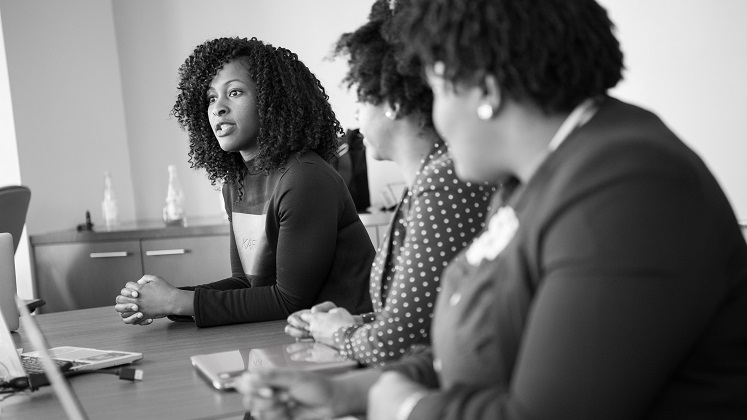In this post, published for International Women’s Day (IWD) 2021, Lucie Mathieu (MSc Psychology of Economic Life) challenges the stereotypes that surround the ‘feminist’ label.
According to IWD and the World Economic Forum, we will not see gender equality happening in our lifetime, and nor will our children. Even more depressingly and similar to other social inequalities, the Coronavirus pandemic halted many advancements that were being made on that front and wiped out 25 years of rising gender equality (IWD 2021 campaign theme, 2021).
Fewer than one in five women in the UK and the US called themselves feminist in 2019 (Scharff, 2019). On paper, shouldn’t we all believe in the political, economic and social equality of the sexes? (Merriam-Webster). So, what’s wrong with this label?
First, the stereotypes associated with the movement are often more negative than positive. They include supposedly hating men to dismissing some of the social constructs created by the patriarchal system: make-up, bras, deodorant and shaving. We are all aware of imagery that portrays feminist women as hysterical, angry, and lacking any kind of humour. While this imagery, for some, may have some truth and their actions are valuable, it is wrong to categorise feminists only in this way. To do this excludes a considerable number of women and, perhaps importantly, the role of men.
Change the narrative about being a ‘feminist’
As highlighted by a study conducted by Roy and colleagues (2007), women exposed to positive feminist stereotypes were twice as likely to self-identify as a feminist, compared to the control or negative stereotypes group. Being exposed to positive stereotypes also created higher self-esteem in these women compared to the two other groups in the study. The feminist movement could then benefit from having a range of more positive narratives that also reflect the diversity of individual realities. Wider ways to advocate for equal rights and positive narratives, for example, using communication channels such as social media or more creative ways such as ‘craftivism’ (including the famous “Pussyhat” symbol), could help the movement be more inclusive. While we have a few examples of these, we need more. Without them the movement for equal rights will not move forward.
To change behaviour, the representation of women as equal has to become the norm
To influence behaviour, attitudes, and beliefs we also need to understand the role of representation for women, and the role of men in endorsing gender equality into societal norms. Only when people perceive themselves as being represented by feminism can more people get behind it.
As Chimamanda Ngozie Adichie beautifully wrote and said 9 years ago, a feminist can be any man or woman recognizing “there’s a problem with gender as it is today and [that it needs to be fixed], we must do better”. Feminism is not anti-male, but anti-patriarchy. It is a movement to end sexism, sexist exploitation and oppression (Hooks, 2000). On this basis, feminism can become a social identity for all genders. The plurality of its definition should allow for anyone to find a voice and a purpose in the fight for equal rights. For example, one can very well be a feminist and support the capitalist system or believe in a radical economic shift while following the feminist Marxism theory (i.e., that the patriarchal capitalist system has been the oppressor of all and through the liberation of social classes, gender equality will arise (Federici, 2010).
The eco-feminist ideology has seen its followers grow in recent years as it believes that women’s rights go hand in hand with environmental protection and advocacy for climate change.
Last, the intersectionality of feminism, as it collects the realities of many different social classes and races, means that this label can never be just one concept with a single overarching narrative (Hooks, 2020). Being a feminist here in the UK, or in India is not the same experience but there is strength to be taken from listening to all these stories, and one does not undermine the other. If you think that gender inequalities in the west are far gone or something from the past, you may be surprised to know that in the UK there are still some clinics providing virginity tests. According to the World Health Organisation (WHO) there is no scientific method for knowing if a woman is virgin or not, thus, perpetuating a lie about women’s health, body and sexuality (Stonehouse, 2020).
Considering the numerous values that feminism includes within its ideology, and as long as you think there is an issue with the way we currently define gender and are ready to advocate for more equal rights, then you may very well be a feminist. There is something experiential to feminism that makes it very unlikely for a cis-heterosexual man to ever experience sexism and sexist oppression (Tienari & Taylor, 2019). However, this does not mean you can’t be a feminist. Already speaking up against these toxic hegemonic masculine standards and deconstructing them would contribute greatly to having more equal rights. This further helps to address the issue of many young boys being taught to avoid fear, weakness and vulnerability at all cost. Young boys who are taught to mask their true selves to become a “tough man”, while only creating human beings with fragile egos (Adichie, 2012).
We’re in 2021, and yet, I have never heard one of my guy friends say privately, even less publicly, “I am a feminist”.
Let us not stand alone for equal rights. Let’s #ChooseToChallenge
Notes:
- The opinions expressed in this post are of the author and not of the Department of Psychological and Behavioural Science or London School of Economics and Political Science.
- For more information about International Women’s Day and to find out more about this year’s theme Choose to Challenge, please visit https://www.internationalwomensday.com/
References:
Adichie, C. (2012). We should all be feminists (1st ed.). Harper Collins.
Federici, S. (2010). „The Reproduction of Labour-Power in the Global Economy, Marxist Theory and the Unfinished Feminist Revolution‟. Globalizations. 3.
Hooks, B. (2000). Feminism is for everybody (1st ed.). Pluto Press.
IWD 2021 campaign theme: #ChooseToChallenge. (2021). Retrieved 4 March 2021, from https://www.internationalwomensday.com/Theme
Merriam-Webster. (n.d.). Feminism. In Merriam-Webster.com dictionary. Retrieved March 4, 2021, from https://www.merriam-webster.com/dictionary/feminism
Roy, R. E., Weibust, K. S., & Miller, C. T. (2007). Effects of Stereotypes About Feminists on Feminist Self-Identification. Psychology of Women Quarterly, 31(2), 146–156. https://doi.org/10.1111/j.1471-6402.2007.00348.x
Scharff, C. (2019). Why so many young women don’t call themselves feminist. Retrieved 4 March 2021, from https://www.bbc.co.uk/news/uk-politics-47006912
Stonehouse, R. (2020). Controversial ‘virginity tests’ sold by UK clinics. Retrieved 4 March 2021, from https://www.bbc.co.uk/news/newsbeat-55078634
Tienari, J., & Taylor, S. (2019). Feminism and men: Ambivalent space for acting up. Organization, 26(6), 948–960. https://doi.org/10.1177/1350508418805287





What a wonderful read Lucie! Not only is it a wonderful review of literature but you have also established trends seen with an honest outlook. Looking forward to more of your work!❤️
What a wonderful read Lucie! Not only is this a brilliant review of literature but a holistic mapping of trends across this space. Your honest, bare outlook on it is commendable!
Looking forward to more such writing 🙂
Thank you very much Julia! 🙂
Hi Lucie!
What do you think about a certificate for equilty? Like an Eco Label or vegan Label. We could found an Organisation to Proof the companies or Institutes, which Like to have the certificate on Here Product. So the clients can choose. Its a big project, but its could change the world and also the patrichial capuitalism.
Sorry for my Bad english! Best regards, Bo
“On paper, shouldn’t we all believe in the political, economic and social equality of the sexes?”. In order to have a rational opinion on this subject, one would need such an accurate, comprehensive and precise understanding of human social biology and evolutionary primatology/anthropology that an opinion would be reasonably based on truth and not some bigoted ideology which to be frank, is what feminism is in most of its forms. I doubt that these academic fields have, to date, enought of an evidence base to reliably and logically refute or support such an opinion so no, I think that we should not until there is.